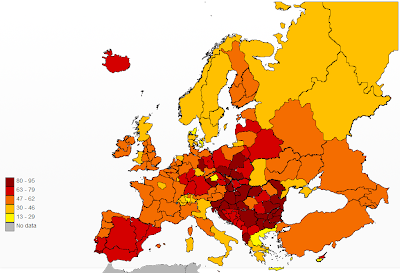A few months ago I was sent a link to this interesting interactive webpage called the Atlas of European Values. Breezing through it I found quite a few interesting facts about cross-country differences in Europe. The page presents a series of maps which include a range of survey data across the globe (but most detailed in Europe) on a number of issues in politics, religion, work, society, well-being and the like. Some of the issues I found were quite striking.
Democracy and authoritarianism
Let's start with this one - the number of people who think democracy is the best political system:
 |
| Source: Atlas of European Values |
The variation is cross-regional in all the maps, which is good as it gives us a deeper insight into inter-country differences. Even though the majority of the population in each country feels that democracy is the best system of governance, the number of people convinced in this idea is far greater in Western Europe (always around or above 90%, except in some parts of Britain - I guess some people there still fancy the monarchy?), than it is in Eastern Europe (the former socialist countries). Take Russia or Ukraine for example, where the majority supporting democracy is the lowest. On the other hand 88% of Belorussians- Belarus being the only remaining dictatorship in Europe - feel that democracy is the best political system.
In another map, when asked whether or not the people have confidence in their governments, a majority of Russians (above 60%) said that they do, as opposed to all other Western (and Eastern) countries exhibiting a very low level of confidence in their government (between 10 and 30%). This goes a long way in understanding why Putin still receives strong support in this country, despite his authoritative reign. Or maybe precisely because of it!
The next graph shows why. It maps the percentage of people that think having a strong leader who does not have to bother with parliament and elections is a good idea (so basically the definition of Putin). Here's how it maps out (the higher the number - the more red an area is - the more people favor an authoritative leader):
 |
| Source: Atlas of European Values |
The East-West divide on this issue is huge. While in Western Europe (including the new EU member states except for Romania and Bulgaria) the number of people who feel this way is quite low (average around 20%), in certain former members of the Soviet Bloc the effect is almost completely the opposite, with the aforementioned exceptions of Romania and Bulgaria leading the way by having almost 90% of the people feeling the need for strong leadership. There are several possible explanations of such behavior. Perhaps the people simply got accustomed to strong authority leading the country during socialist times, so in current times of misery and a failed consolidation of capitalism, they invoke upon the older system characterized by more stability and different informal institutions - or to be more precise, where the level of social trust was higher.
But look at Poland for example. Out of all former socialist countries it has the least desire for strong authority. History plays an important role here. Poland was historically always torn between two superpowers - Prussia (Germans) and the Russian empire, so their final episode of socialism only made them even more resilient never again to have an autocratic system.
Technocratic governments
Moving on, the next graph is on whether or not experts should run the government. The darker the area, the more people believe that a government of technocrats is a good idea.
 |
| Source: Atlas of European Values |
A very interesting finding where former socialist countries like ex-Yugoslavia, Hungary, Bulgaria, Romania, Czech Republic, Slovakia and Poland all seem to feel strongly in favour of an expert-led government (on average more than 80%). This correlates well with the lack of trust in government and especially with the lack of trust in domestic political elites. The people are simply faced with lack of supply of high-quality individuals on the political market, and are running out of options. Interestingly enough, Spain joins this group of countries, probably due to the disastrous effect its political elites had on the country.
Mind you, the survey was taken in 2008, so some of these factors might have changed due to the influence of the crisis. For example Greece and Italy, two countries that actually did have technocratic governments (neither of which lasted for too long), had it even worse in terms of political cronyism before the crisis but the people there didn't think that resorting to experts is the best alternative. Perhaps that explains why the reign of technocratic governments was short-lived.
Government intervention
Finally, the issue of whether the state should control firms more effectively.
It is no wonder why West Germany (notice the German divide), Britain, Scandinavia, and Poland are doing relatively better than the rest of Europe. In the end it all comes down to preferences and informal institutions.
 |
| Source: Atlas of European Values |